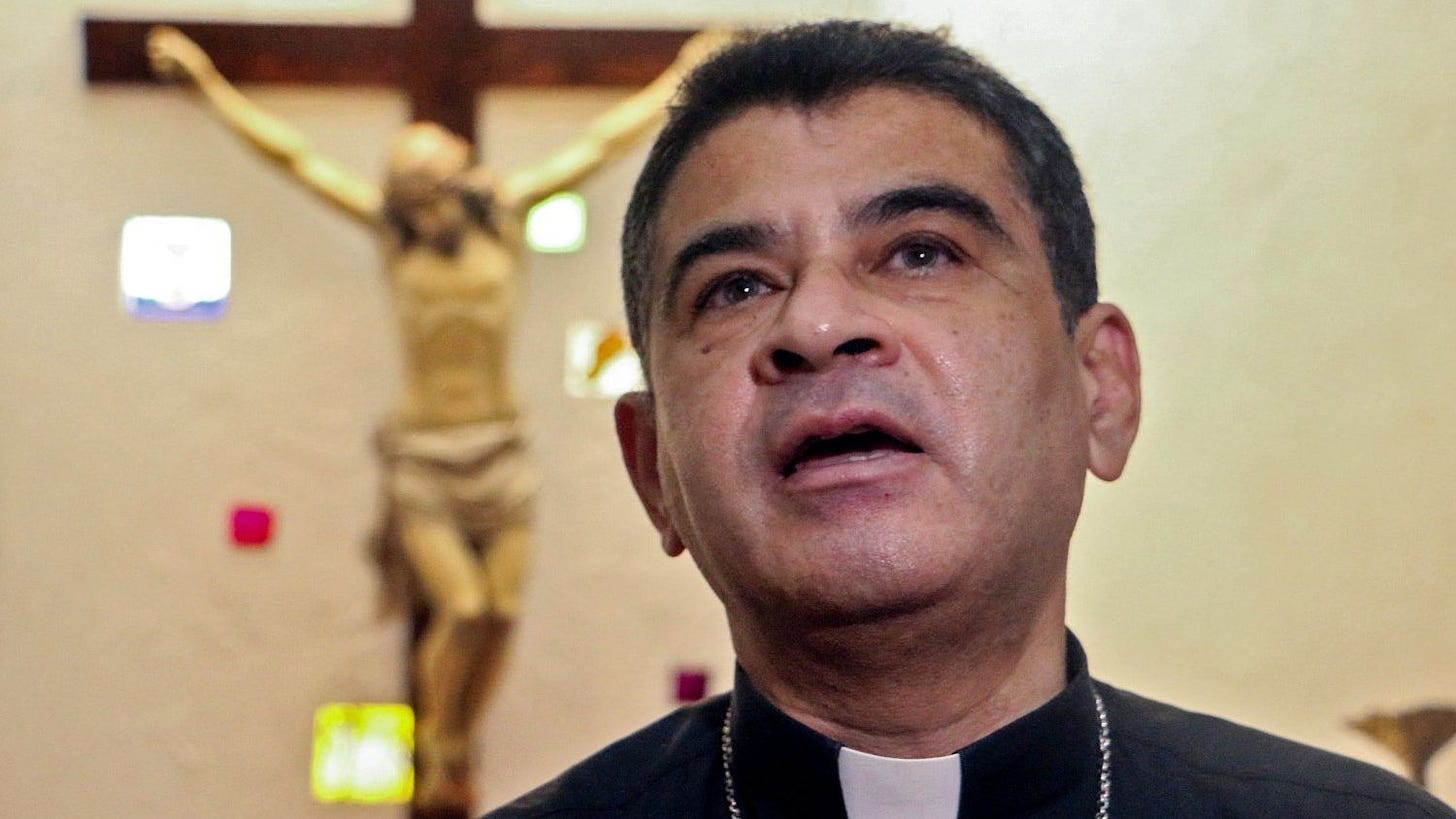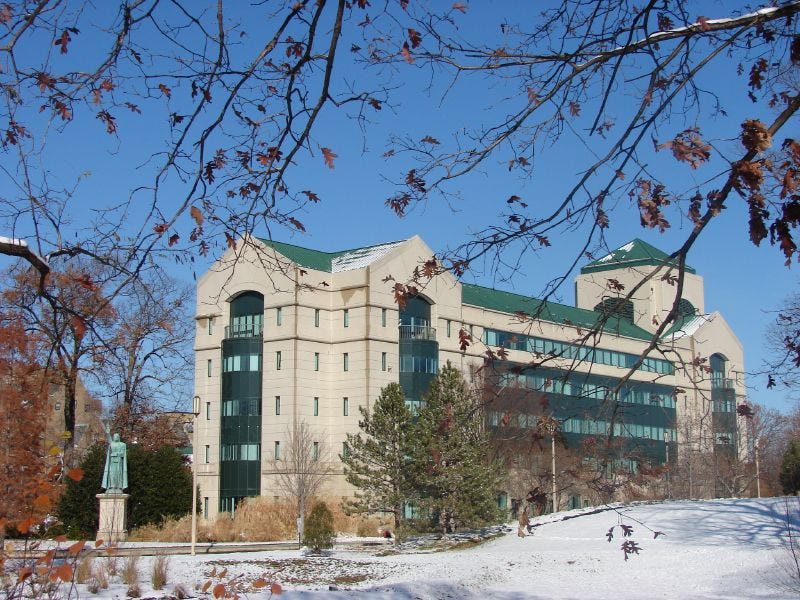One day after he declined to be deported from his country, Bishop Rolando Álvarez of Matagalpa, Nicaragua was sentenced to 26 years in prison.
And while Pope Francis has spoken out against the bishop’s treatment, along with bishops and priests exiled from Nicaragua, few Churchmen inside the country have publicly recognized Álvarez’s criminal prosecution.
The bishop, 56, was accused of conspiracy against national integrity, propagation of fake news, aggravated obstruction of functions, and disobedience to authority.
The ruling was read in a press conference by Judge Octavio Rothschuh of the Court of Appeals of Managua. It came shortly after the bishop declined an opportunity to be deported from Nicaragua.
Judge Rothschuh explained that Álvarez received a one-year sentence for disobedience of authority for refusing to be exiled, five years for the propagation of fake news, five years and four months for aggravated obstruction of functions, and 15 years for “treason against the homeland.”
Along with 222 political prisoners deported Feb. 9, Álvarez was also stripped of his Nicaraguan nationality and sentenced to “perpetual loss of civic rights,” meaning he has lost the right to have a Nicaraguan ID, passport, work permit, along with civil rights to freedom of speech or association.
The ruling also likely means that if Álvarez ever leaves prison, he will lose his right to serve as a priest in Nicaragua, and he could be forcefully deported from the country.
Álvarez’s trial was originally set for March 28, but was rescheduled for Feb. 15 after seven of his collaborators were sentenced to 10 years in prison, and then exiled from Nicaragua.
But the bishop’s trial was actually held in secret on Feb. 10, soon after other 222 political prisoners were deported from the country.
📰
—
The bishop was reportedly set himself to be deported Feb. 9, but he did not leave the country.
There are different accounts of his decision not to leave.
President Daniel Ortega claimed Feb. 10 that Álvarez had been in line to board a plane voluntarily along with other exiles, but changed his mind at the last moment — allegedly telling officials that “he had to meet the bishops and requested a meeting,” and that he wanted to talk to the priests that had already boarded the plane.
But local sources have a different account, saying that when Álvarez was offered exile, he instead said of his priests under collaborators under arrest: “Let them be free, I will serve their sentences.”
Ortega told local media that Álvarez was sent to La Modelo prison, after over six months of house arrest, because he had refused to leave the country.
The president also said that Álvarez had been “living in a mansion” while under house arrest and that he had been treated “like no other prisoner in the history of this country.”
—
Álvarez was initially placed under house arrest in August 2021, after a tense siege of his rectory in Matagalpa, which came as the bishop criticized the Ortega regime’s crackdown on Catholic radio stations in the country.
After his arrest, the Vatican and the bishops’ conference worked for months to negotiate with the Nicaraguan regime for Álvarez’s release. But the Ortega administration refused to free Álvarez, offering instead only the possibility of exile, which Álvarez refused several times.
The bishop repeatedly insisted that he would remain in Nicaragua, even if that meant decades of incarceration.
In December, Álvarez was sent to a house administered by Nicaraguan authorities, where he could no longer receive any visitors. Speculation about his health abounded, because Álvarez suffers from high blood pressure and seemed to have lost significant weight while he was detained.
Now in prison, Álvarez is now one of the 38 political prisoners that remain in Nicaragua. The list also includes Fr. Manuel García and Fr. José Leonardo Urbina, whom the Nicaraguan regime did not free because they were not serving sentences for conspiracy.
Some political observerrs in Nicaragua initially expected that the Feb. 9 deportation of political prisoners would be a sign that the Ortega regime would open a of dialogue with the U.S., the European Uunion and the Vatican over human rights abuses.
But the Nicaraguan austhorities dismissed that possibility the next day, when Álvarez was subjected to a one-day trial conducted in secret.
Álvarez’s family was not allowed to attend trial nor to appoint a defense attorney they had chosen. Instead, Judge Nadia Tordencilla imposed a public defender with ties to other questionable prosecutions.
On Sunday, Feb 12, Pope Francis broke his silence on Álvarez’s case:
“The news from Nicaragua has saddened me a great deal, and I cannot but remember with concern Bishop Rolando Álvarez of Matagalpa, whom I care about greatly, sentenced to 26 years imprisonment, and also those who have been deported to the United States. I pray for them and for all those who are suffering in that dear nation, and I ask for your prayers. Let us also ask the Lord, by the intercession of the Immaculate Virgin Mary, to open the hearts of political leaders and all citizens to the sincere search for peace, which is born of truth, justice, freedom and love, and which is achieved through the patient pursuit of dialogue. Let us pray together to Our Lady,” he said.
The remarks were the first the pontiff had offered in public about Álvarez’s case since August, when the bishop was initially placed under house arrest.
But while Francis spoke out, the Nicaraguan bishops’ conference has not commented publicly on Álvarez’s case. And Cardinal Leopoldo Brenes of Managua offered Sunday only timid criticism of the Nicaraguan law which allowed deported prisoners to lose their Nicaraguan citizenship.
“If the laws have been deteriorating and if he have situations totally contrary to what God wants, the Lord calls us to forgiveness,” Brenes said.
“Someone asked me what can we do for Monsignor Rolando [Álvarez]? And I told them that we should pray, that the Lord may give him strength and discernment in all of his actions,” he added.
Meanwhile, auxiliary Bishop Silvio Báez of Managua, exiled in Miami since 2018, said in his Sunday homily that the Nicaraguan regime was criminal.
“Those who put righteous people in jail and banish citizens from their own country are criminals. These abominable acts are not just the whims of deranged people, legal irregularities or non-compliance with international rules. No. To offend in anger, to defame out of revenge, to imprison unjustly, to torture viciously and to condemn to exile are true crimes and those who act in this way are criminals, who will have to be brought to justice sooner or later,” Báez said.
Elsewhere in the United States, a group of priests exiled from Nicaragua concelebrated a Mass at Saint Mark the Evangelist parish in Hyattsville, MD.
Fr. Ramiro Tijerino, former rector of the Universidad Juan Pablo II presided over the Mass.
Fr Óscar Benavides, pastor of the Espíritu Santo Parish in Mulukukú and former youth director of the Matagalpa diocese, read the Gospel, while Fr. Sadiel Eugarrios, former vicar of the Cathedral of Matagalpa, preached the homily.
"We must not be afraid. We must bear witness to our baptism," said Fr. Eugarrios.
"The more than 200 Nicaraguans who have come to this country, we come with much uncertainty, to seek refuge in families, good people who have received us with a heart so wide, so big, seeking comfort, because unfortunately evil has taken over some hearts that need conversion and we must pray for the conversion and salvation of souls, not for condemnation," he added.
Before the final blessing, Fr. Tijerino said that on Feb. 10, they all went to the chapel of the USSCB, where they were able to celebrate mass “after six months [incarceration], (...) hunger is bad, but it is worse when the bread you need is the bread of the Eucharist,” he said.
Benavides was jailed after preaching a homily critical of the regime on August 14. Tijerino, Eugarrios, Díaz, deacon Raúl Vega, seminarians Darvin Leyva and Melkin Centeno and cameraman Sergio Cárdenas were trapped inside the episcopal residence of Matagalpa with Bishop Álvarez from August 4 to Aug 19.
The standoff began after the Nicaraguan authorities shut down ten radio stations belonging to the Diocese of Matagalpa. After Fr. Uriel Vallejos refused to give away some radio equipment in his parish, a 48-hour siege started in which he was not allowed to leave the parish rectory and power and running water to the parish were cut.
Bishop Álvarez called for a Mass and Holy Hour in the cathedral in protest but was not allowed to leave his residence. His detention came soon after.
📰




